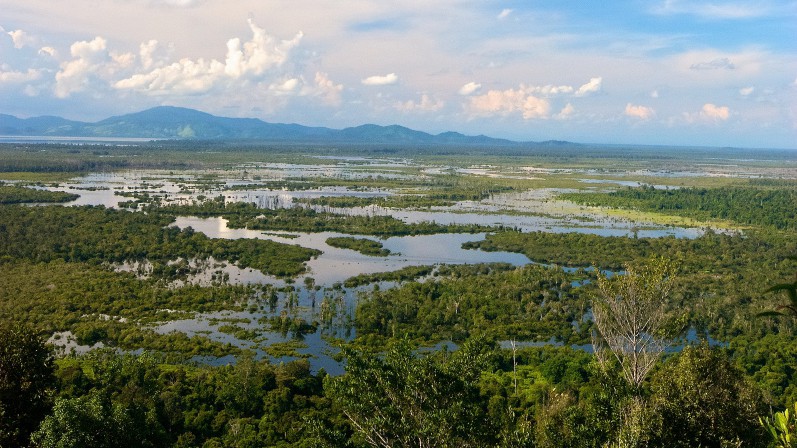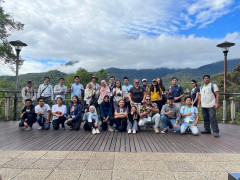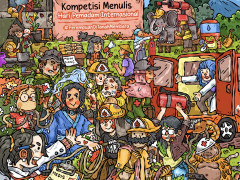Pantau Gambut Goes to The 2nd Asia Parks Congress
By Agiel PrakosoThree Important Findings in the Pantau Gambut Study "Refocusing on Peat Restoration Amidst Regional"

Regional elections every five years affect the sustainability of local government pledges and policies regarding peatland restoration. The national government has committed to restoring 2 million hectares of peatland under BRG coordination from 2016–2020. However, peatland protection and restoration take a long time, so coordination among local governments is required to maintain the sustainability of these efforts after 2020.
The protection and restoration of 2 million hectares of peatland in seven priority provinces is a national effort involving many parties, including local governments. Presidential Regulation No. 1/2016 on the Peatland Restoration Agency (BRG) emphasizes the importance of cross-institutional coordination in implementing the national program. Article 14 of this regulation further highlights that regional governments, especially governors, have the authority to appoint an official to coordinate their Regional Peatland Restoration Team.
The government’s role in peatland restoration is also outlined in the Minister of the Environment and Forestry Regulation No. 61/2017 on the Assignment of Government Relations for Peatland Restoration Activities in the 2018 Fiscal Year in the Scope of the Environment and Forestry to the Governors of Riau, Jambi, South Sumatra, West Kalimantan, Central Kalimantan, South Kalimantan, and Papua.
In the Peatland Restoration Strategic Plan 2016–2020, BRG states that one of their strategies to ensure successful peatland restoration is to increase the awareness, capacities, and engagement of peatland communities, civil society groups, private sector actors, and government bodies at all levels in sustainably managing peatlands. Thus, local government policies related to peatland restoration and management are essential to the successful implementation of the national peatland restoration program.
Regional elections every five years affect the sustainability of local government pledges and policies regarding peatland restoration. The national government has committed to restoring 2 million hectares of peatland under BRG coordination from 2016–2020. However, peatland protection and restoration take a long time. So, coordination among local governments is required to maintain the sustainability of peatland protection and restoration efforts after 2020 and ensure previous efforts were not in vain.
There is a high risk of peatland fires in Indonesia, caused by both weather and human-induced deforestation. Preventative action is required at the regional level to ensure fires do not break out, and the resulting impacts on the economy and public health are avoided.
MODIS National Oceanic and Atmospheric Administration (NOAA) sensor data for the period of February–May 2018, coinciding with the regional election cycle, reveals hundreds of fire risk hotspots in peatland restoration priority areas.
In order to support the sustainability of the national peatland restoration program, Pantau Gambut reviewed key issues in the program, vision, and mission of regional candidates in seven peatland restoration priority provinces. The review covered 13 governor and vice-governor candidate pairs from four provinces, seven mayor and vice-mayor candidate pairs in two cities, and 55 regent-vice regent candidate pairs in 18 regencies. Information came from the program, vision, and mission documents that candidates submitted to the General Election Commission (KPU).
In order to analyze public opinion on key issues, Pantau Gambut also conducted a random survey. The survey included 100 participants: 69 men and 31 women; 13 from South Sumatra, 13 from Riau, seven from Jambi, 41 from Central Kalimantan, 8 from West Kalimantan, 17 from South Kalimantan, and 1 from Papua. The survey was conducted on 29-30 April 2018, during the National Peatland Jamboree in Kiram village, South Kalimantan.
The review and survey revealed three important findings:
Finding 1: Peatland issues did not garner much attention in regional elections.
Most candidate pairs participating in regional elections prioritized infrastructure development, economic growth, corruption, and education.
- Of the 75 candidate pairs, only two mentioned peatland restoration issues in their program, vision, or mission. They were the governor-vice governor candidate pair for South Sumatra, Ishak Mekki and Yudha Pratomo, and the regent-vice regent candidate pair for Pulang Pisau, Edy Pratowo and Pudjirustary Narang. The former included fire response and peatland management as priority programs in the social and environmental sectors. The latter stated that one of their missions is to enhance natural resource use through critical land rehabilitation and replantation in collaboration with BRG and non-governmental organizations.
- Only eight candidate pairs specifically mentioned forest and land fire response in their program, vision, or mission: Ishak Mekki and Yudha Pratomo (South Sumatra), Syamsuar and Edy Nasution (Riau), Muhamad Lukman Edy and Hardianto (Riau), Sutarmidhi and Ria Norsan (West Kalimantan), Iskandar and Dja'far Shodiq (Ogan Komering Ilir), Citra Duani and Effendi Ahmad (Kayong Utara), Surya and Winda Natalia (Katingan), and Sakariyas and Sunardi (Katingan).
- Sixty-one candidate pairs have environmental programs covering (1) regional development and planning considering conservation and environmental factors, (2) economic growth taking environmental sustainability into account, (3) utilization and processing of natural resources through environmentally-friendly mining and oil and gas extraction, (4) improvement of environmental health, including sanitation and waste management, (5) redress of environmental pollution caused by industry, and (6) protection of conservation areas and their flora and fauna. Meanwhile, 14 candidate pairs did not include any environmental programs in their campaign platforms.
Finding 2: Background did not affect whether candidate pairs give priority to peatland issues.
Political background and experience did not determine whether candidates included peatland restoration issues in their platforms. Of the 32 candidate pairs with experience as incumbents or in other political roles, only two included a peatland restoration program in their campaign platform. Their experience should have made peatland restoration issues more prominent, as they are a national priority with implications on regional policy.
Finding 3: The public generally considers economic issues more important than peatlands.
Pantau Gambut’s 100-person survey had the following results:
- A total of 87 participants stated that there is a regional election in their area. The other 13 stated that there are no regional elections in 2018 in their region, because they held elections last year or will conduct elections next year.
- A total of 95 participants indicated that they have voted in regional elections.
- A total of 94 participants stated they will vote in the upcoming regional elections.
- A total of 73 participants stated they are aware of regional candidates’ platforms.
- A total of 98 participants answered that candidates’ peatland protection pledges are important.
- Participants ranked environmental issues as their third priority, after economic growth and infrastructure development.
Based on these findings, we can conclude that, although the public generally considers peatland protection to be an important issue, it was not a priority for regional candidates during the elections. However, regional governments play a significant role in mainstreaming environmental issues, particularly peatland protection and restoration.
Therefore, both government bodies and civil society organizations need to cooperate to actively increase public understanding of the importance of peatland protection and restoration to sustainable livelihoods and social welfare.



